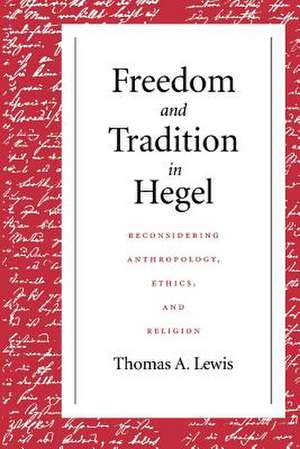Three Rival Versions of Moral Enquiry – Encyclopaedia, Genealogy, and Tradition
Autor Alasdair Macintyreen Limba Engleză Paperback – 11 mai 1994
| Toate formatele și edițiile | Preț | Express |
|---|---|---|
| Paperback (1) | 261.41 lei 6-8 săpt. | |
| MR – University of Notre Dame Press – 11 mai 1994 | 261.41 lei 6-8 săpt. | |
| Hardback (1) | 590.15 lei 6-8 săpt. | |
| MR – University of Notre Dame Press – 11 mai 1994 | 590.15 lei 6-8 săpt. |
Preț: 261.41 lei
Nou
Puncte Express: 392
Preț estimativ în valută:
50.02€ • 52.12$ • 41.42£
50.02€ • 52.12$ • 41.42£
Carte tipărită la comandă
Livrare economică 03-17 aprilie
Preluare comenzi: 021 569.72.76
Specificații
ISBN-13: 9780268018771
ISBN-10: 0268018774
Pagini: 252
Dimensiuni: 153 x 228 x 15 mm
Greutate: 0.42 kg
Ediția:1
Editura: MR – University of Notre Dame Press
ISBN-10: 0268018774
Pagini: 252
Dimensiuni: 153 x 228 x 15 mm
Greutate: 0.42 kg
Ediția:1
Editura: MR – University of Notre Dame Press
Recenzii
"MacIntyre's project, here as elsewhere, is to put up a fight against philosophical relativism. . . . The current form is the 'incommensurability,' so-called, of differing standpoints or conceptual schemes. Mr. MacIntyre claims that different schools of philosophy must differ fundamentally about what counts as a rational way to settle intellectual differences. Reading between the lines, one can see that he has in mind nationalities as well as thinkers, and literary criticism as well as academic philosophy. More explicitly, he labels and discusses three significantly different standpoints: the encyclopedic, the genealogical and the traditional. . . . [T]he chapters on the development of Christian philosophy between Augustine and Duns Scotus are very interesting indeed. . . . [MacIntyre] must be the past, present, future, and all-time philosophical historians' historian of philosophy." —The New York Times Book Review
"This book deepens and defends MacIntyre's claim that genuinely rational enquiry requires membership in a particular type of moral community. He offers the most persuasive recent restatement of the Thomist position on the relation of metaphysics to morality." —Richard Rorty
Notă biografică
Alasdair MacIntyre is research professor of philosophy at the University of Notre Dame. He is the author of numerous books, including After Virtue, A Short History of Ethics, and Whose Justice? Which Rationality?, all published by the University of Notre Dame Press.
Textul de pe ultima copertă
"Highly recommended." —Library Journal
"This book deepens and defends MacIntyre's claim that genuinely rational enquiry requires membership in a particular type of moral community. He offers the most persuasive recent restatement of the Thomist position on the relation of metaphysics to morality." —Richard Rorty
"MacIntyre's project, here as elsewhere, is to put up a fight against philosophical relativism. . . . The current form is the 'incommensurability,' so-called, of differing standpoints or conceptual schemes. Mr. MacIntyre claims that different schools of philosophy must differ fundamentally about what counts as a rational way to settle intellectual differences. Reading between the lines, one can see that he has in mind nationalities as well as thinkers, and literary criticism as well as academic philosophy. More explicitly, he labels and discusses three significantly different standpoints: the encyclopedic, the genealogical and the traditional. . . . [T]he chapters on the development of Christian philosophy between Augustine and Duns Scotus are very interesting indeed. . . . [MacIntyre] must be the past, present, future, and all-time philosophical historians' historian of philosophy." —The New York Times Book Review
Alasdair MacIntyre is research professor of philosophy at the University of Notre Dame. He is the author of numerous books, including After Virtue, A Short History of Ethics, and Whose Justice? Which Rationality?, all published by the University of Notre Dame Press.
"This book deepens and defends MacIntyre's claim that genuinely rational enquiry requires membership in a particular type of moral community. He offers the most persuasive recent restatement of the Thomist position on the relation of metaphysics to morality." —Richard Rorty
"MacIntyre's project, here as elsewhere, is to put up a fight against philosophical relativism. . . . The current form is the 'incommensurability,' so-called, of differing standpoints or conceptual schemes. Mr. MacIntyre claims that different schools of philosophy must differ fundamentally about what counts as a rational way to settle intellectual differences. Reading between the lines, one can see that he has in mind nationalities as well as thinkers, and literary criticism as well as academic philosophy. More explicitly, he labels and discusses three significantly different standpoints: the encyclopedic, the genealogical and the traditional. . . . [T]he chapters on the development of Christian philosophy between Augustine and Duns Scotus are very interesting indeed. . . . [MacIntyre] must be the past, present, future, and all-time philosophical historians' historian of philosophy." —The New York Times Book Review
Alasdair MacIntyre is research professor of philosophy at the University of Notre Dame. He is the author of numerous books, including After Virtue, A Short History of Ethics, and Whose Justice? Which Rationality?, all published by the University of Notre Dame Press.
Descriere
Alasdair MacIntyre—whom Newsweek has called "one of the foremost moral philosophers in the English-speaking world"—here presents his 1988 Gifford Lectures as an expansion of his earlier work Whose Justice? Which Rationality? He begins by considering the cultural and philosophical distance dividing Lord Gifford's late nineteenth-century world from our own. The outlook of that earlier world, MacIntyre claims, was definitively articulated in the Ninth Edition of the Encyclopaedia Brittanica, which conceived of moral enquiry as both providing insight into and continuing the rational progress of mankind into ever greater enlightenment. MacIntyre compares that conception of moral enquiry to two rival conceptions also formulated in the late nineteenth century: that of Nietzsche's Zur Genealogie der Moral and that expressed in the encyclical letter of Pope Leo XIII Aeterni Patris.
The lectures focus on Aquinas's integration of Augustinian and Aristotelian modes of enquiry, the inability of the encyclopaedists' standpoint to withstand Thomistic or genealogical criticism, and the problems confronting the contemporary post-Nietzschean genealogist. MacIntyre concludes by considering the implications for education in universities and colleges.
Alasdair MacIntyre is research professor of philosophy at the University of Notre Dame. He is the author of numerous books, including After Virtue, A Short History of Ethics, and Whose Justice? Which Rationality?, all published by the University of Notre Dame Press.
The lectures focus on Aquinas's integration of Augustinian and Aristotelian modes of enquiry, the inability of the encyclopaedists' standpoint to withstand Thomistic or genealogical criticism, and the problems confronting the contemporary post-Nietzschean genealogist. MacIntyre concludes by considering the implications for education in universities and colleges.
Alasdair MacIntyre is research professor of philosophy at the University of Notre Dame. He is the author of numerous books, including After Virtue, A Short History of Ethics, and Whose Justice? Which Rationality?, all published by the University of Notre Dame Press.
















